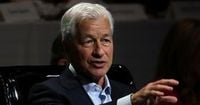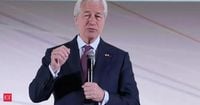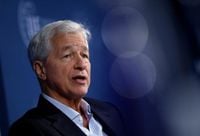Jamie Dimon, the longtime CEO of JPMorgan Chase and one of the most influential voices in global finance, has sent tremors through the investment community with a stark warning: he believes a significant U.S. stock market correction is not only possible, but increasingly likely within the next six to twenty-four months. Dimon's comments, made during a wide-ranging interview with the BBC on October 8, 2025, have reverberated across financial circles, highlighting a growing sense of unease at the highest levels of banking and investment.
"I am far more worried about that than others," Dimon told the BBC, referencing the overheated state of the U.S. stock market. While many investors are pricing in the possibility of a modest 10% correction, Dimon estimates the real risk could be closer to 30%. "The timing of these things is almost impossible," he cautioned, but emphasized that the probability of a major downturn is much higher than the market currently acknowledges.
Dimon's concerns are rooted in a complex web of global risks. He pointed to escalating geopolitical tensions, persistent heavy government spending, mounting fiscal deficits, and the remilitarization of nations as key drivers of uncertainty. "So I say the level of uncertainty should be higher in most people's minds than what I would call normal," he remarked, urging investors and policymakers alike to recognize the extraordinary risks lurking beneath the surface of recent market highs.
These warnings come at a time when U.S. stock indices, including the Nasdaq Composite, have been pushing record levels, buoyed by optimism around technological innovation and robust corporate earnings. Yet, Dimon's message stands in sharp contrast to this exuberance. According to reporting by The Economic Times and the BBC, he described the current market as "overheated and risky," and cautioned against "unrestrained optimism"—especially around the potential of Artificial Intelligence (AI).
While many economists have sounded the alarm about a possible AI-driven investment bubble, Dimon takes a nuanced view. "The way I look at it is AI is real, AI in total will pay off. Just like cars in total paid off, and TVs in total paid off, but most people involved in them didn't do well," he explained to the BBC. He acknowledged that some of the money pouring into AI will "probably be lost," but overall, he believes the technology will deliver long-term value. Still, he warns that investors should not mistake speculative enthusiasm for guaranteed returns.
Beyond market risks, Dimon also addressed the broader security environment. He has previously warned that the U.S. could run out of missiles in just seven days if conflict erupted in the South China Sea—a scenario he cites as evidence of the world's increasing volatility. "People talk about stockpiling things like crypto, I always say we should be stockpiling bullets, guns and bombs. The world's a much more dangerous place, and I'd rather have safety than not," Dimon said, reiterating his call for greater investment in military preparedness.
Dimon's interview was not solely focused on doom and gloom. During his visit to Bournemouth, UK, he announced a £350 million investment in JPMorgan's local campus and £3.5 million for area non-profits, moves hailed by UK Chancellor Rachel Reeves as "fantastic news for the local economy and people who live" in Dorset. Dimon praised Reeves's economic stewardship and expressed optimism about the UK's efforts to encourage innovation and reduce regulatory burdens.
On the subject of central banking, Dimon expressed confidence that the U.S. Federal Reserve would maintain its independence despite political pressures, including frequent criticism from former President Donald Trump. "I would take Trump at his word" that he would not interfere with the Fed, Dimon said, even as Trump has publicly called Fed Chair Jerome Powell a "moron" and a "numbskull." Still, Dimon noted that persistent inflation could make it difficult for the Fed to deliver the rate cuts the market is hoping for.
Dimon also touched on the shifting landscape of international relations. He described the U.S. as "a little less reliable" as a global partner, though he acknowledged that some Trump administration policies had encouraged Europe to increase its investment in NATO and boost competitiveness. Regarding trade, Dimon revealed ongoing efforts to strengthen ties with India, anticipating a deal to reduce tariffs imposed over India's oil trade with Russia. "In fact, I've spoken to several of the Trump officials who say they want to do that, and I've been told that they are going to do that," Dimon told the BBC.
Speculation about Dimon's own political ambitions has swirled for years, with figures like hedge fund manager Bill Ackman calling him an "incredible choice" for Treasury Secretary and some even floating the idea of a presidential run. Dimon, however, downplayed such rumors, saying, "It wasn't on the cards," and that his focus remains on keeping JPMorgan "healthy and vibrant." Still, he quipped, "If you gave me the presidency, I'd take it. I think I'd do a good job."
Financial experts and market observers are now parsing Dimon's words for clues on how to navigate the months ahead. According to Market Minute, Dimon's warning echoes concerns recently voiced by the International Monetary Fund and the Bank of England, both of which have highlighted mounting global risks and the potential for sudden market corrections. A severe U.S. market downturn, as Dimon predicts, could trigger a global de-risking event, impacting international markets, investment flows, and even the stability of foreign banks and sovereign wealth funds with significant U.S. equity exposure.
Investors are being urged to reassess their risk exposures, especially those heavily concentrated in speculative sectors like AI. Defensive sectors—such as consumer staples, utilities, and healthcare—may offer safer havens in the event of a sharp sell-off, while highly leveraged firms or those reliant on continuous access to cheap capital could face existential threats. Dimon's message: prepare for volatility, focus on fundamentals, and don't be lulled into complacency by recent market gains.
Ultimately, Jamie Dimon's cautionary stance serves as a sobering reminder that, even in times of apparent prosperity, underlying risks can accumulate to dangerous levels. As the financial world absorbs his warning, the coming months may well test whether investors have taken heed—or whether, as Dimon fears, the next correction will catch many off guard.



